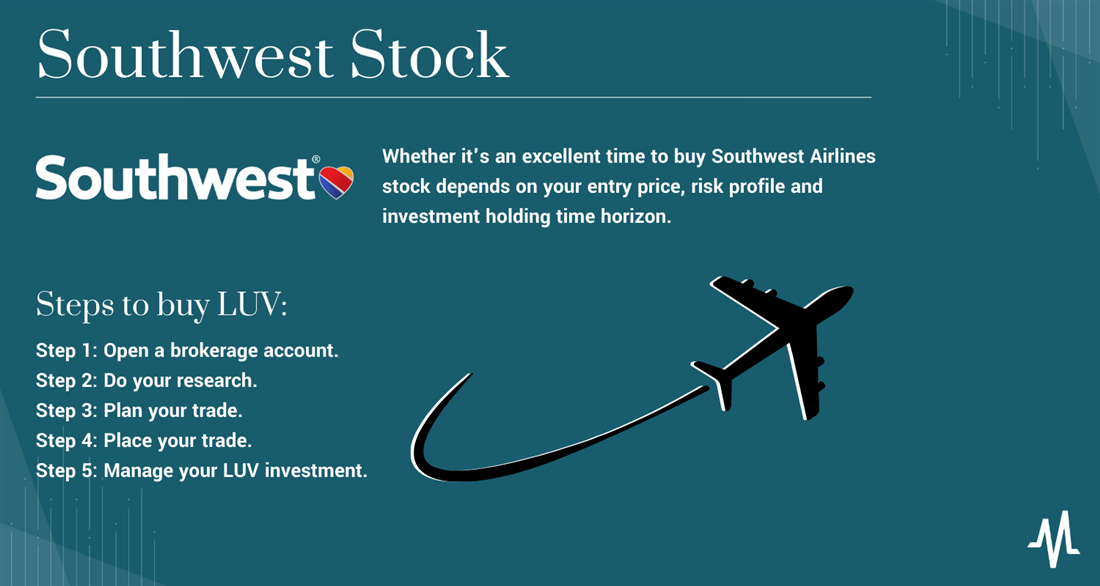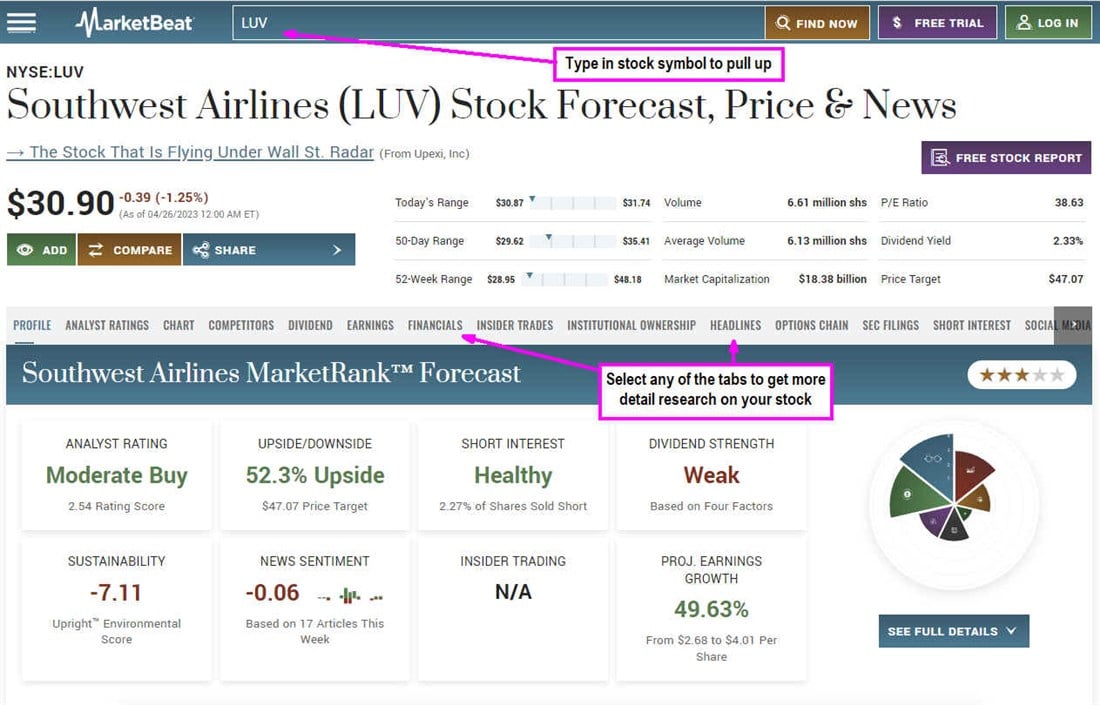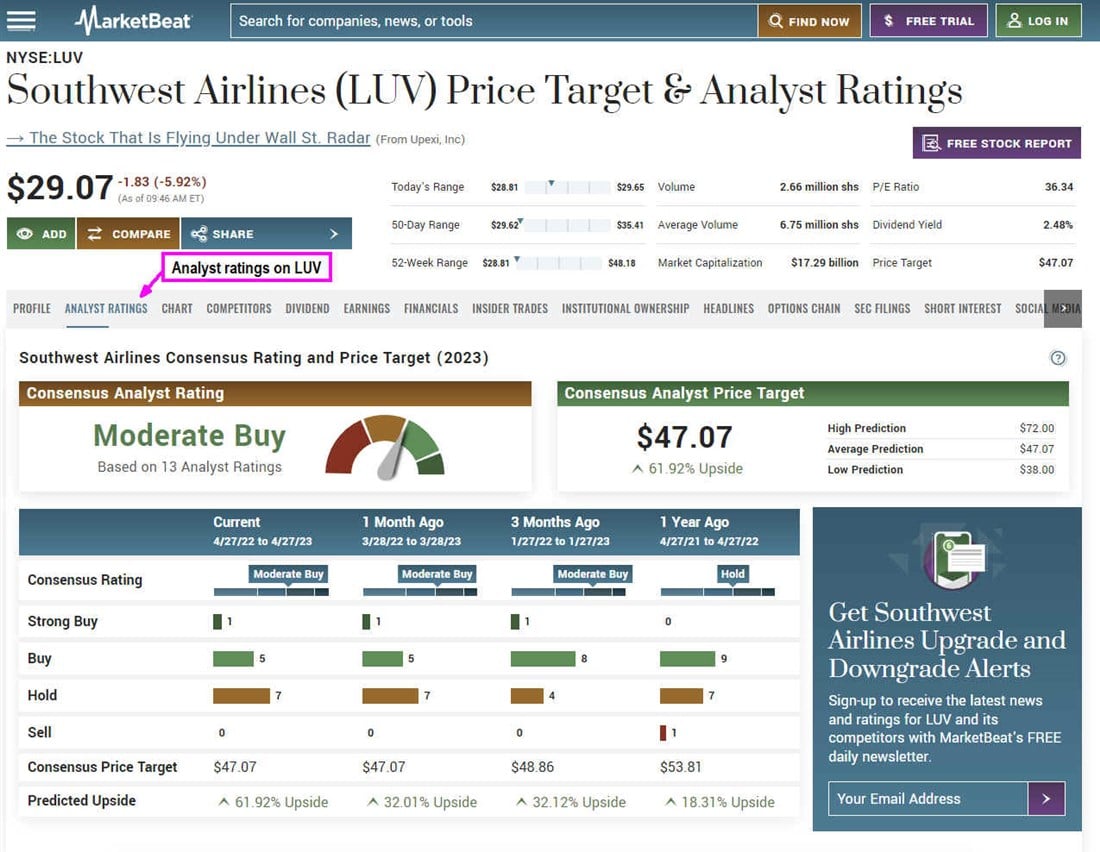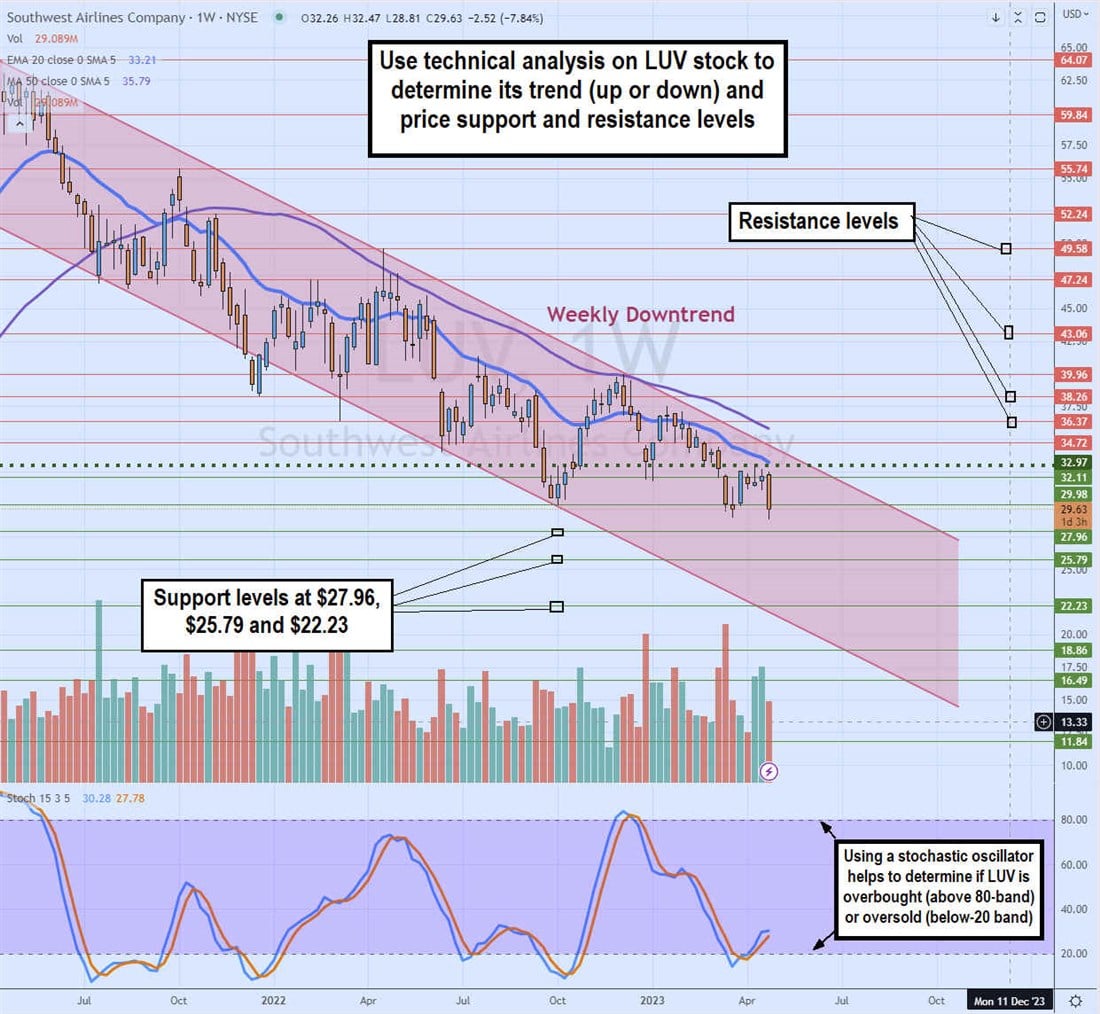
The airline industry was devastated by the COVID-19 pandemic. Travel and leisure became an epicenter industry as lockdowns and travel restrictions limited the availability of flights, crews and even pilots. Airline stocks plummeted.
Debt levels climbed as investors wondered if the industry would ever rebound. Southwest Airlines broke its decades-long run of profitability during the pandemic but was one of the first airlines to return to profitability in 2022. Its unique point-to-point model has helped to keep the airline running efficiently. This article will provide additional insights for investors wanting to buy Southwest stock.
Overview of Southwest Airlines Co.
As the world's largest low-cost airline carrier, Southwest Airlines had humble beginnings as an in-state airline with three Boeing 737 plans servicing three routes in Texas. Southwest Airlines was initially founded in 1966 by the charismatic visionary lawyer Herbert Kelleher and small carrier operator Rollin King in 1966. CEO Kelleher was famous for his chain smoking (up to 40 cigarettes a day) and whiskey-drinking outspoken persona habitually breaking the rule book. He became chairman and CEO after 1978. He was a disrupter that irritated the major carriers every chance he got as they opposed the low-cost carriers' foray into Texas.
After five years of legal battles with the incumbent airlines trying to prevent its entry into the Texas market, Kelleher elevated the battle up to the Texas Supreme Court. The company officially changed its name to Southwest Airlines and took flight in 1971. Southwest had just one class for passengers, no assigned seats, no meals and only flew Boeing 737 airplanes. Operating just one plane model kept maintenance costs low and turnaround times fast at 20 minutes. This enabled them to offer very low-priced tickets. Initially, Southwest only operated in Texas between three routes: Houston, San Antonio and Dallas.
The company continued to operate intrastate until 1979, when it expanded routes nationally to become a regional airline carrier. Kelleher had instilled a fun and supportive family-like culture with its employees. This ecosystem installed a loyal and dedicated workforce that was instrumental in growing it into a major airline carrier when its revenues surpassed $1 billion in 1989. Southwest has consistently ranked high among customer satisfaction surveys. By 2019 Southwest grew its fleet to over 700 Boeing 737 planes flying to over 120 destinations in 11 countries, generating annual revenues north of $20 billion. Southwest is the only airline to report 47 consecutive years of profit until the COVID-19 pandemic shut down economies in 2020.
The pandemic bought the airline industry down to its knees. Southwest could weather COVID-19 better than its competitors and navigate a recovery faster upon the re-opening. Much of the existing operating model and strategic decisions enabled Southwest to fare better than competitors. Southwest had a solid balance sheet as it was highly profitable ahead of the crisis, and its low-cost operating strategy kept the company buoyant as travel demand vaporized. Since it had few international flights and no business class, it didn't suffer the fallout from international travel bans like the major carriers.
Its point-to-point model has helped keep it agile with any changing demand patterns. The company continued to stress operational efficiency and low costs, highlighting its no-cost flight changes and no baggage fee perks to passengers. Southwest has emerged from the pandemic with revenues rebounding past pre-COVID levels. Profitability has been inconsistent due to inflationary pressures and customer expense reimbursements over operational disruptions during the 2022 holiday season. However, the company has the lowest debt among the four major airline carriers at $8 billion, with liquidity of $12.7 billion. Southwest should continue to recover with the travel and leisure rebound as consumers shift discretionary spending from products to services.

How to Buy Southwest Airlines Co.
Here are the five steps to buy Southwest Airlines stock, an NYSE-listed stock with the symbol LUV.
Step 1: Open a brokerage account.
To buy LUV stock, you will need to have a brokerage account. It can be an online or app-based account with zero commission trades or through a full-service broker that will assign you a registered investment advisor. Zero-commission brokerages are a more do-it-yourself (DIY) platform versus full-service brokers. Many full-service brokers are also zero-commission but may charge a fee based on your assets in the account. You will also have to decide whether to have a margin account which enables you to leverage buying power on a 2-for1 basis for overnight and swing trades, or a cash account. It's crucial to stay within the budget when you use margin, and remember that you are paying margin interest when it's used.
Step 2: Do your research.

Research is the key when investing in stocks. MarketBeat provides excellent resources for performing research. Just type the symbol LUV in the search tab for information on Southwest Airlines.
 To delve into more detailed information like earnings or analyst ratings for LUV on MarketBeat:
To delve into more detailed information like earnings or analyst ratings for LUV on MarketBeat:
- Click on the respective tab located above the MarketRank™ forecast.
- Work your way through the tabs to get a good foundation of knowledge on Southwest.
- Read through its latest earnings report, conference call information, and headlines. It helps to make a checklist of positives like EPS and revenue year-over-year (YoY) growth and negatives like a lowered reverse guidance.
Solid fundamental research is vital in determining your actions on Southwest stock buy or sell. It's always prudent to compare the fundamentals to peers in the industry and other blue chip stocks if you are familiar with blue chip stocks.

Step 3: Plan your trade.
Use technical analysis to help plan your trade. Look at the daily, weekly and or monthly candlestick charts to gauge the trend, price support and resistance levels. You can also use a momentum indicator like a stochastic or a MACD histogram to gauge whether LUV is in the overbought and oversold area. Perform technical analysis to predetermine your entry price range and exit price ranges. Entries should be near support levels or at breakout levels. Exits are upside price targets and downside stop-loss levels.
Be careful not to chase the entries and be aware of reversal patterns like market structure low and high triggers. Once you've determined your entry and exit price levels, scale into the position with several entries at different prices or buy in one entry. Make sure not to overleverage yourself and take too many shares.
Step 4: Place your trade.
Log into your brokerage account. Determine the Southwest Airlines buy limit price levels, number of shares and place your trade. Patience is a virtue, so consider limit orders. However, if you already know how to buy Southwest Airlines stock and prefer to get in at the market price, go for it. Once you've gotten into a position, it's essential not to forget about it but to manage the position.
Step 5: Manage your investment.
Remember your upside price target(s) and downside stop loss prices? Ensure you diligently exit some or all of your stock if and when those price levels hit. Being aware of earnings report dates and staying abreast of important press releases and events is also prudent. Investing is not a set-it-and-forget-it activity, especially when you own individual stocks. If you're seeking to diversify your portfolio further, consider looking at the best defense stocks on MarketBeat.
Is Southwest Airlines Undervalued or Overvalued?
Southwest Airlines is historically undervalued based on its forward price-earnings (P/E) ratio of 10.85, while its trailing P/E is at $36.36. This is likely due to the recent quarterly losses from higher labor wages and inflation. The rising labor costs result from contract renegotiations with various airline workers. Labor unions are something that all airlines have had to settle on, so it doesn't just affect Southwest.
Inflation decreased from 9.1% in June 2022 to 5.1% by April 2023. The monthly stochastic has fallen under the 20-band, the oversold level. The stock appears undervalued. Remember, undervalued stocks can continue to become more undervalued and oversold.
Southwest Airlines Company Share Dividends
Southwest stock has been through many structural events regarding its shares. Here's a list to be aware of.
Stock Split
A stock split is an action determined by the board of directors to uniformly increase the outstanding shares by dividing a single share of stock into multiple pieces. In most cases, it makes shares more accessible to more shareholders since the price may be too high.
For example, a 2-for-1 stock split would split one $100 stock into two shares of $50. The value remains the same, but the price is split between the pieces. It's like taking a pizza with eight slices and cutting it into 16. When there are more slices, it's still the same net amount of pizza. Southwest Airlines have had 14 stock splits since 1977 in various ratios from 2-for-1 to 5-for-4. Its most recent stock split was a 2-for-1 split on January 18, 2001.
Share Volatility
Southwest shares have a beta of 1.15 which implies low volatility. The beta determines how the stock moves compared to changes in the benchmark index. The beta for the S&P 500 is 1. If a stock has a beta of 2, it tends to move twice the percentage amount of the S&P 500.
For example, if the S&P 500 is up 10% for the year, a stock with a beta of 2 would be up 20%. That also applies to losses. Higher beta stocks are riskier, with more volatility by nature. Stocks with a beta of less than 1 move fractionally compared to the S&P 500. If you accept more volatility for more upside potential, look at the best aerospace stocks on MarketBeat.
Performance Over Time
Southwest Airlines stock has had a 10-year performance of up 109%. Its lifetime performance is up 506% since it went public on the New York Stock Exchange on June 8, 1971. Shares of LUV have a one-year trading performance of down (34%).
Is it a Good Time to Buy Southwest Airlines Stock?
Whether it's an excellent time to buy Southwest Airlines stock depends on your entry price, risk profile and investment holding time horizon. While past performance doesn't guarantee future results, a long-term holding period can smooth out the price fluctuations, especially considering dollar cost averaging.
The stock is oversold on the monthly candlestick chart, but it has been in a downtrend since peaking at $64.65 in April 2021. Remember that the pandemic low hit $22.47 in March 2020. If you're interested in the industry, look at MarketBeat's airline stocks list.
Point-to-Point Flight Model
One of the most unique aspects of Southwest is its point-to-point flight model versus the traditional hub-and-spoke flight model used by other major airline carriers. Point-to-point enables carriers to be more agile and shift capacity and resources with changing demand patterns. The planes are all Boeing 737 planes that the pilots, flight, maintenance, and crew are intimately familiar with. Southwest also implements a rolling hub model in its base cities.
FAQs
Here are some answers to frequently asked questions.
Is Southwest stock a good stock to buy?
Making a decision about a Southwest Airlines stock buy doesn’t have to be complicated. It can be an excellent stock if you have a long-term horizon and consider a dollar-cost-averaging strategy in a diversified portfolio. The basic rule: Don't put all your eggs into one basket. That means spreading your investment capital across many holdings and assets.
How high will Southwest stock go?
The sky's the limit — pun intended. Southwest stock's growth depends on its future revenue, earnings growth and macroeconomic backdrop. The travel and leisure sector has been recovering during a normalization process after the pandemic. If you want more volatility, get aggressive with defense stocks on MarketBeat.
How do you invest in Southwest stock?
You can invest in Southwest stock by buying shares through your broker. Consider buying on pullbacks with a long-term investment time frame. Dollar-cost averaging can help to attain a better average cost basis. Remain prudent and stay abreast of earnings reports and material press releases.





